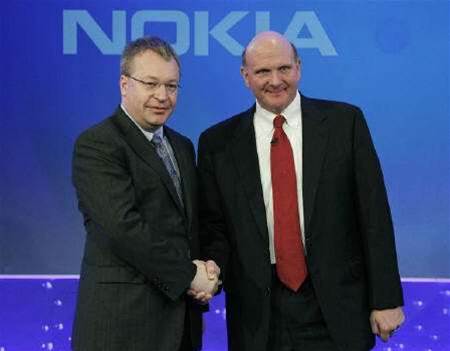Microsoft has yet to persuade investors that a deal to put its Windows software on Nokia phones is not just two losers hoping to combine into one winner.

The financial benefits for Microsoft are not clear. By the time new phones born out of their alliance hit the market, both may have ceded more market share to Apple's iPhone and Google's Android system.
And some point out the risk that Nokia's full-scale endorsement may alienate rival phone makers such as Samsung Electronics and LG Electronics, now supporters of Microsoft's fledgling Phone 7 platform.
"They do have to actually put some phones out there in the market and, as best I can tell, that's easily six months down the road," said Al Hilwa, an analyst at tech research firm IDC. "The Android market is moving really fast. They've got their work cut out."
The deal is a "an opportunity, rather than a slam-dunk," he added. "We'll have to wait and see how this works out."
Most industry-watchers agree Microsoft's tie-up is an effective way for the software company to get its operating system on some 30 million phones a quarter without a costly and disruptive acquisition, putting it back on the smartphone playing field.
But its shares fell as much as 1.6 percent as investors worried how it would work in practice.
"It's a great arrangement from Microsoft's standpoint," said Sid Parakh, an analyst at McAdams Wright Ragen. "But it's very hard to model these things out, given we don't know what the financial terms are, we don't know what the timelines are, and we don't know what kind of monetisation to expect."
Microsoft and Nokia are hammering out the financial details of their "broad strategic partnership" to make Windows Phone 7 the primary operating system for Nokia phones.
But broadly, Nokia will pay royalties for licensing the phone software and in return Microsoft will invest in marketing and developing the phones, but it isn't clear which will be the greater sum.
Battle of ecosystems
Analysts said the licensing agreement is complicated by the fact some of Nokia's technology will be included in the phones, such as mapping and navigation.
The Finnish phone-maker may also get a cut of the revenue Microsoft gets from putting its Bing search engine on the devices.
That alone could be worth US$1.25 billion a year to Microsoft, estimates Richard Williams at Cross Research.
"What's really going to prove important is whether they get enough of a strong ecosystem out there in terms of developers, applications, advertising monetization, relationships with carriers," Hilwa said.
Nokia failed to generate developer excitement with its Symbian system and Microsoft is only just beginning to make its mark on the burgeoning app markets, where users can download a variety of useful tools and games to their devices.
Microsoft has only about 8,000 apps for Windows Phone 7, compared with some 15,000 for Research in Motion's BlackBerry, more than 100,000 for Google's Android system and more than 300,000 for Apple's iOS on iPhones and iPads.
"Microsoft is still in development mode really," said Avi Greengart, research director for consumer devices at Current Analysis. "There are core features that aren't there yet, things as simple as cut and paste."
Analysts are hoping for more details on Microsoft's technical plans for Windows Phone 7 at the annual Mobile World Congress in Barcelona this week.
There are questions about how much Microsoft will allow Nokia to customise its software and whether its agreement with Nokia will discourage handset makers such as Samsung Electronics, LG and HTC -- currently the chief supporters of Windows Phone 7 in the United States.
That is a risk Microsoft is willing to take, said NPD Group's consumer electronics and wireless industry analyst Ross Rubin, given it gets a large, dedicated phone designer committed primarily to its software rather than Android.
"By focusing primarily on Windows Phone 7, Nokia will be creating more competitive handsets for that operating system, as opposed to other manufacturers that are focusing primarily on Android," said Rubin.
Microsoft only had a 4.2 percent share of the global smartphone market last year, according to research firm Gartner, trailing Apple with 15.7 percent, Research in Motion with 16 percent and Google's Android with 22.7 percent.
Despite steadily losing share, Nokia's Symbian was still the leader last year, with 37.6 percent of the smartphone market. But most of those were lower-end devices compared with the likes of the iPhone.
The question now is how much, and how fast, Microsoft can capitalise on that market share.
"Nokia has a tremendous brand presence, not in North America, but pretty much everywhere else in the world, and a reputation for hardware quality that's second to none," said Greengart. "But Microsoft and Nokia are going to have tremendous execution risk."
The coming together of two slow-moving titans may not ultimately pay off, warned Pierre Ferragu, an analyst at Sanford C. Bernstein in London.
"A partnership with another heavy giant doesn't sound like the right remedy," he added.
(Editing by Edwin Chan; and Andre Grenon)



_(22).jpg&h=140&w=231&c=1&s=0)
_(20).jpg&h=140&w=231&c=1&s=0)




_(26).jpg&w=100&c=1&s=0)

 iTnews Executive Retreat - Security Leaders Edition
iTnews Executive Retreat - Security Leaders Edition












_(1).jpg&h=140&w=231&c=1&s=0)



